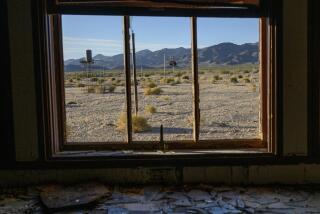Global warming has made the weather better for most in U.S. -- but don’t get used to it, study says

- Share via
Since Americans first heard the term global warming in the 1970s, the weather has actually improved for most people living in the U.S. But it won’t always be that way, according to a new study.
Research shows Americans typically — and perhaps unsurprisingly — like warmer winters and dislike hot, humid summers. And they reveal their weather preferences by moving to areas with conditions they like best.
A new study in the journal Nature has found that 80% of the U.S. population lives in counties experiencing more pleasant weather than they did 40 years ago.
“Virtually all Americans are now experiencing the much milder winters that they typically prefer, and these mild winters have not been offset by markedly more uncomfortable summers or other negative changes,” write Patrick Egan, a political scientist at New York University, and Megan Mullin, professor of environmental politics at Duke University.
It’s hard to complain about sunny days, but the researchers foresee a problem. If Americans think climate change has benefited their lives so far, they’ll have little motivation to demand action or overcome apathy in responding to global warming, the scientists write.
By the end of the century, however, the study predicts the pleasant weather trend to reverse as summers heat up to uncomfortable temperatures.
If greenhouse gas emissions continue unchecked, 88% of the current population will live in areas where the weather is less pleasant than it was before. The paper does not predict how changing weather patterns will influence migration patterns over the coming century.
“We’ve received warmer winters without paying the price for hotter summers,” Mullin said in an interview. “But when you look forward... that’s going to shift, and Americans will experience weather, by their current preferences, they’re going to think of as worse.”
In the study, Egan and Mullin wanted to see how the public’s experience with weather has changed since 1974. They developed a metric they called the “weather preference index” that quantifies Americans’ appetite for warmer winters and temperate summers.
The metric looked at maximum temperatures in January and July, as well as summer humidity and precipitation data. For almost everyone in the U.S., winters have become warmer and summers have remained relatively stable.
According to their metric, the population centers experiencing the most worsening of weather were in the northeast and parts of Southern California and Arizona. However, the most severe worsening occurred in sparsely populated areas of the upper Midwest.
Whereas climate scientists report on average temperatures over time and extreme events related to climate change, Mullin and Egan wanted to look at climate change through the eyes of the general public. Many people’s beliefs and concerns about climate change form partly based on their experience with the daily weather, the study says.
And based on Americans’ experience with climate change so far, “none of this gives the American public reason to demand change and public policies to address this critical problem,” Mullin said.
So when news of weather milestones — such as Los Angeles’ hottest February on record — breaks, what happens?
“Climate scientists are reporting those results with alarm, but based on these findings the public is not receiving the message with alarm,” Mullin said. “They’re receiving it with complacency. They’re thinking of warm, sunny winter days.
Mullin suggested climate scientists and climate communicators focus the message on extreme weather events — the wildfires, droughts, floods and hurricanes that take significant human and economic tolls.
In a commentary accompanying the Nature study, Joacim Rocklöv, an epidemiologist at Umea University in Sweden who has studied the effects of climate change on human health, noted the United States is both one of the most influential countries in forming global policy and one of the largest greenhouse gas emitters.
“It therefore matters globally if U.S. populations feel that they have benefited from the effects of climate change up to now,” he wrote. “Moreover, many Americans may not recognize that these effects will change.”
The study only looked at the U.S. population’s preferences, but people in Canada, Russia and China will eventually get more temperate weather — and may come to see winter warming as a benefit of climate change. However, people in Asia and Africa may have already seen the reversal, Rocklöv suggested.
“Perhaps an initially positive experience has already reversed in some areas, causing displeasure or emigration from affected regions,” Rocklöv wrote.
Follow me on Twitter @seangreene89 and “like” Los Angeles Times Science & Health on Facebook.
MORE SCIENCE NEWS
Greenland ice sheet’s sudden meltdown catches scientists by surprise
Could mysterious gamma-ray burst be linked to gravitational wave find?
Dinosaurs were in decline long before the Chicxulub asteroid finished them off







